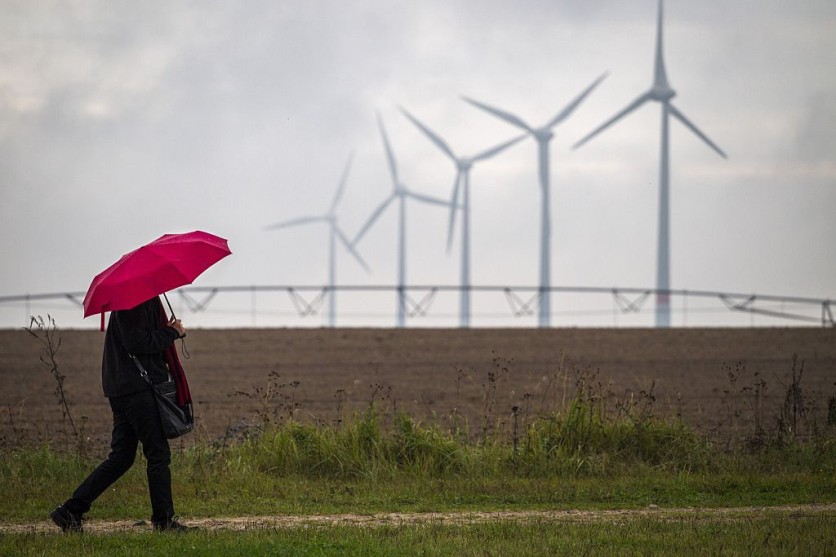In Europe, renewable energy is progressively overtaking fossil fuels, as indicated by a recent report showcasing a remarkable reduction in both greenhouse gas emissions and fossil fuel-based power generation.

A woman walks with an umbrella a long a path near wind turbines at the energy-sufficient village of Feldheim, 80km south of Berlin on October 16, 2014.
Seeing Record Drop in Fossil Fuel
A recent study indicates a significant decline in both greenhouse gas emissions and power production from fossil fuels across Europe. The European Union experienced an unprecedented decrease in pollution stemming from fossil fuel-based power plants.
Describing it as an unprecedented collapse in coal and gas electricity generation, The Verge reported that this underscores the remarkable transition towards renewable energy sources within the region's power grid.
In a historic milestone, fossil fuels reached their lowest levels since comprehensive record-keeping began in 1990, constituting less than a third of the EU's electricity generation in 2023.
Meanwhile, carbon-pollution-free energy generation, comprising renewables and nuclear power, accounted for over two-thirds of the electricity mix, doubling the output of fossil fuels.
Sarah Brown, Europe program director at Ember, expresses optimism about the ongoing structural decline of fossil fuels.
She notes that while records date back to 1990, the current data suggests that fossil fuel usage is at its lowest point ever, as there were no alternative energy sources to replace it during previous periods when fossil fuels dominated.
Coal experienced the most significant decrease in 2023, generating 26 percent less electricity compared to the previous year. Gas power plants also saw a notable decline, producing 15 percent less electricity, marking the most substantial annual reduction in several decades.
Collectively, these reductions resulted in a significant 19 percent decrease in both fossil fuel generation and carbon dioxide emissions, contributing to a reduction in power sector pollution.
This reduction surpasses the decrease observed in 2020 during the COVID-19 pandemic when business and travel shutdowns led to a temporary decline in pollution levels.
Short-Lived Trend
The European Union witnessed a resurgence in coal generation following the Russian invasion of Ukraine, spurred by efforts to reduce reliance on Russian gas.
However, this comeback appears to have been short-lived, with coal generation now dwindling once again. According to Brown, coal generation has halved since 2016 and is on a trajectory toward complete phase-out.
Meanwhile, renewables have reached a new milestone, constituting 44 percent of the EU's electricity mix, the highest proportion on record.
Wind energy experienced significant growth in 2023, accounting for 18% of electricity generation, equivalent to France's total power demand, and surpassing gas for the first time.
CNBC reported that solar energy contributed 9% to the mix, while hydropower generation rebounded from dry spells experienced in 2022.
Energy efficiency plays a significant role in the ongoing transformation, often overshadowed by other factors. However, with the anticipated transition to electric vehicles and electrified homes, demand is expected to rebound.
This underscores the critical importance of prioritizing energy efficiency while simultaneously increasing the deployment of solar and wind farms. Despite progress, there remains a considerable journey ahead.
While wind generation expanded by 13 percent in 2023, sustained growth of 15 percent annually throughout the decade is necessary to align with the EU's clean energy objectives, as outlined in the report.
In its commitment to combat climate change, the EU aims to achieve net-zero carbon dioxide emissions by 2050.

ⓒ 2026 TECHTIMES.com All rights reserved. Do not reproduce without permission.




